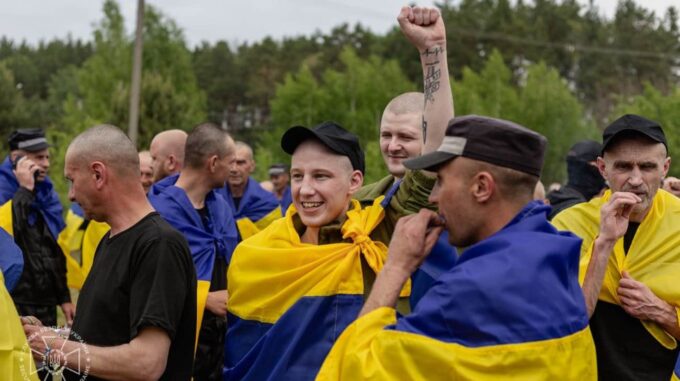More than half of the Ukrainian defenders of Azovstal have already been released from Russian captivity, marking an important step in the process of bringing Ukrainians home

This was reported by the Main Intelligence Directorate of the Ministry of Defense of Ukraine and representatives of the Ukrainian defense authorities, confirming significant progress in the liberation of prisoners of war. Andriy Yusov, Deputy Head of the Coordination Headquarters for the Treatment of Prisoners of War and one of the key official representatives of military intelligence, stated on "Radio Liberty" that 1,279 Ukrainian military personnel who defended Azovstal during the fierce battles for Mariupol in 2022 have been returned from Russian captivity. Among them are 455 soldiers from the Azov Regiment and hundreds of other defenders who fought in the hottest spots of Donbas. According to Yusov, approximately half of the roughly 2,500 Ukrainians who held the defense of Azovstal have been returned so far. These figures demonstrate considerable momentum in the prisoner exchange process, which, in his words, is among the best indicators compared to other units defending Ukraine during the fighting against Russian aggression. "This shows growth and progress in our important task — returning as many of our heroes home as possible. But we must remember: behind every number is a human life, and no statistics can convey the pain and anxiety of their families waiting for their loved ones," he emphasized. Yusov also shared results from the latest exchange, in the format "1000 for 1000," which allowed the liberation of military personnel from 46 different units that previously were not included in publicly known exchange lists. This confirms that the Ukrainian side has achieved significant progress in returning defenders and minimizing losses, both among military units and civilians. At the same time, he stressed that revealing names and units, including "Azov," in public statements should be done carefully — too prominent names and information could be exploited by Russian special services to undermine negotiations or create destabilization. "We must never forget: our prisoners are people held in the hands of Putin and his agencies. Russian services conduct active informational warfare, attempting to distort the situation, discredit our defenders, and use public information for their own purposes. The more attention we give to individual persons or units in the media, the greater the chances that this information will be used against Ukraine," Yusov underscored. He recalled that since the start of the full-scale war, Ukraine has been able to bring back over 6,000 citizens who were held in captivity or as hostages — including military personnel, civilians, and representatives of various security and defense forces. He emphasized that this number is not of a "second-class" status, as among those returned are true heroes who fought on the front lines, intelligence officers, special forces soldiers, as well as women and officers whom the enemy kept hostage due to its cruelty and ruthlessness. Yusov highlighted the importance of caution and due diligence in publications about the freed, especially regarding individual units or persons, because uncontrolled disclosures could be used by the enemy to carry out repressions or obstruct the return process. "Russian special services are conducting a cynical informational pressure, and every message about specific prisoners or their names should be presented thoughtfully and responsibly — to avoid harming our defenders and complicating their return home," he warned. He also mentioned that since the beginning of the full-scale invasion, Ukrainian military and civilians have managed to return over 6,000 citizens through 65 exchange procedures. These mainly include servicemen of the Ukrainian Armed Forces, members of territorial defenses, border guards, and others. It is noteworthy that among them are well-known intelligence officers, special operations soldiers, officers, and even convicted military personnel — all of whom have the right to return and protection. At the same time, some critics and military commanders have expressed reservations about the recent exchanges. For example, Colonel Denis "Redis" Prokopenko, commander of the Azov Battalion, stated that during the latest three-day exchange, none of the Azov fighters were released. Prokopenko voiced skepticism about the sincerity of the Ukrainian leadership’s motivation and interest in returning specifically these heroes. Meanwhile, another prominent figure — writer and former Kremlin political prisoner Stanislav Asseyev — reported that among those released in the "1000 for 1000" process, there are no civilians, despite the fact that one of them has been in Russian captivity for eight years. Overall, the exchange process and the return of Ukrainian citizens continues, and Ukrainian authorities assure unlimited support and efforts to free everyone who has fallen into captivity. Thanks to the efforts of government structures, the military, and diplomats, Ukraine is gradually bringing back its heroes and preparing for further steps in the fight to free all who defended its sovereignty and territorial integrity.

